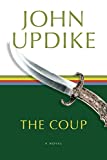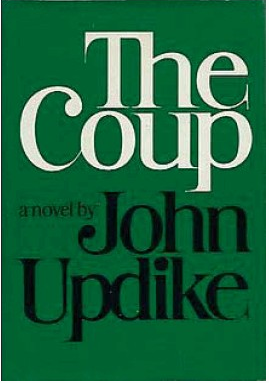In the Lethbridge Herald [Canada], Trevor Busch wrote, “Today’s Africa is finally a reawakening giant” that “seems increasingly ready to join a family of nations as developed and free societies.
“In the early 1970s, things were much different. Africa was a wild west of cowboy diplomacy as both the Soviet Bloc and the United States faced off in numerous African backwaters over ideological differences, with both sides arming their own ideologicallly-friendly regimes in a deadly game of Cold War cat and mouse.
“Unfortunately freedom—no matter what side of the political spectrum Africans found themselves under these various regimes—was an unintended casualty of proxy warfare.
“American novelist John Updike stepped into this maelstrom with The Coup (1978). Set in a fictional sub-Saharan African nation known as Kush during the early 1970s, it follows the struggles of dictator Col. Ellellou in attempting to prevent a pro-Western coup from sweeping him from power and instituting a style of government and economy he most hates.”
Busch added, “While The Coup closely follows events in Africa involving Col. Ellellou and his failing regime, it also serves as a scathing rebuke of American Cold War foreign policy in Africa, and is illustrative of the contradictions and hypocrisy that were inherent in both superpowers propping up tin-pot dictators in the name of freedom. . . . Through the hybrid character of Ellellou, Updike takes the reader on a journey that exposes the best and worst of 20th century Africa as well as America.”
“Although Ellellou is nothing if not a fascinating character . . . it tends to beg the question how he attained power in the first place, something which Updike mostly side-steps in the novel.
“Other characters in The Coup are sometimes almost laughingly one-sided, especially women, who serve almost no purpose for Ellellou other than sexual concubines for his satisfaction. . . . While Updike’s The Coup is a fascinating exploration of how late 20th century Americans viewed their nation’s own foreign policy choices through the viewpoint of a hostile but perceptive outsider, the novel falls entirely short of greatness.
“The reader is left wondering if The Coup is meant to be an abstract polemic or a realistic tale of a violent change of government in a poor African nation.”
Or perhaps a third possibility that seems to resonate with American readers: That it’s a comic novel, a satire of American over-consumption and arrogance, as well as a satire of the African dictators caught in the middle of all these Cold War shenanigans?


